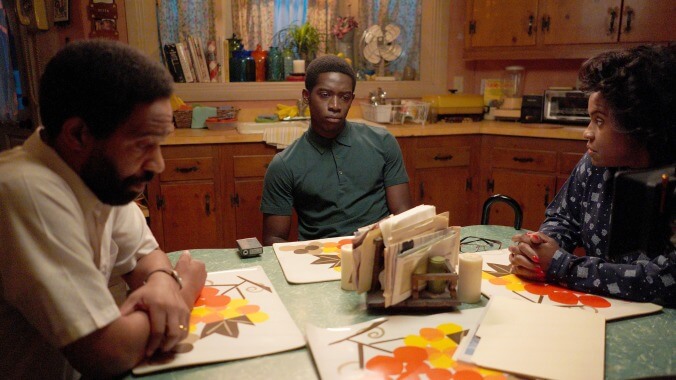
One of the most prevalent complaints about the season-three finale of Snowfall was that it let Franklin (Damson Idris) off too easy. That after weeks of building to a moment where he’d reckon with killing Officer Wright (Marcus Henderson), the show pulled a fast one with a contrived “it was all a dream”-style episode wherein Franklin managed to escape harm at the hands of Mel (Reign Edwards). That criticism is both valid and yet doesn’t quite capture the fact that this story has to keep moving, that the thing that takes Franklin deeper into this world is his ability to just barely escape violence. Every time he comes up against something that should turn him away from the game, he survives by the skin of his teeth, and it justifies his feeling of being untouchable.
While that finale was poignant at times but also inelegant in its storytelling, the first few episodes of season four feel a bit like the show is on autopilot. It’s still entertaining, but it’s also lost some of its edge. The season picks up in the midst of chaos; it’s 1985, Ronald Reagan has been re-elected, crack cocaine has taken hold of Franklin’s community in South Central, and every gang of every size is trying to get a piece of the action. There’s a lot of money to be made, and everyone is flooding the market. That means competition and gang violence and a lot of dead bodies in the streets, which Franklin knows is bad for business.
The first four episodes of the season pull on a lot of different plot threads, interweaving them in ways reminiscent of the best crime fiction, like the work of James Ellroy or Walter Mosley, the latter a producer and writer on the show. Mosley even names a Black bookstore-owning couple after himself in the third episode, and if you’re a legend like Mosley, you get to indulge that bit of ego. Franklin is looking to settle a beef between erratic gang leaders Manboy (Melvin Gregg) and Skully (De’aundre Bonds) in order to keep his business running smoothly. At the same time, he’s dabbling in local politics, working with Cissy (Michael Hyatt) to gain influence with politicians and real estate mogul Paul Davis (Steven Williams) to secure some sway within the halls of power, and in particular to try and smother Officer Nix (Jesse Luken), who’s still threatening the Saint family. Meanwhile, Teddy (Carter Hudson) and Gustavo (Sergio Peris-Mencheta) are finding new roadblocks in their drug business, and the higher-ups in government are taking more notice of the drug pipeline and what’s happening in South Central.
In the season premiere, Franklin, on the advice of Teddy, decides it’s time to pick a side in the war rather than continuing to angle for a truce. He goes to Skully and tells him he’ll flush out Manboy so that he can get his revenge. Then he goes to Manboy and tells him they’ll set up a buy that will allow Manboy’s crew to ambush Skully and his men. The ambush goes wrong, leaving Franklin on the run from a betrayed Skully, and his dreams of a permanent end to this war thwarted. Over the course of the first four episodes, Franklin vacillates between moments of triumph, like securing a deal with Paul Davis that gets Officer Nix demoted and ensures his own piece of a real estate deal, and sheer dread, like when his family is in danger.
There’s a lot of great, tight, entertaining plotting in these first few episodes. Gustavo and Teddy’s relationship is actually complex and interesting this season as they attempt to navigate a new foe in the drug trade and a new dynamic with each other. A reporter out of Los Angeles is digging into Franklin’s life and the murder of Officer Wright, getting closer and closer to finding the truth. Then there’s the many threads of the drug war, with Franklin trying to climb to the highest rungs of the ladder, Leon (Isaiah John) trying to set out on his own, and Cissy (Michael Hyatt) and Alton (Kevin Carroll) caught in the middle, all while the main players start to really see the damage crack cocaine is doing in their community. All of this means Snowfall is still a sharp, engaging show, but thematically, it’s lost some punch.
In essence, at least through the first four episodes, Snowfall doesn’t seem to have as much to say about the War On Drugs or race or politics. This season feels more focused on plot than ever, and while that’s not a bad thing because this show is great with plot, there’s definitely a hole where a sharper critique and thematic underpinning used to be. As much as the show is crafting an expansive look at the rise of crack cocaine and the accelerating War On Drugs, it doesn’t feel as particularly insightful as it used to. That’s a shame, but shouldn’t stop you from once again diving into a show that’s still tremendously engaging when it comes to characterization, atmosphere, and plotting.